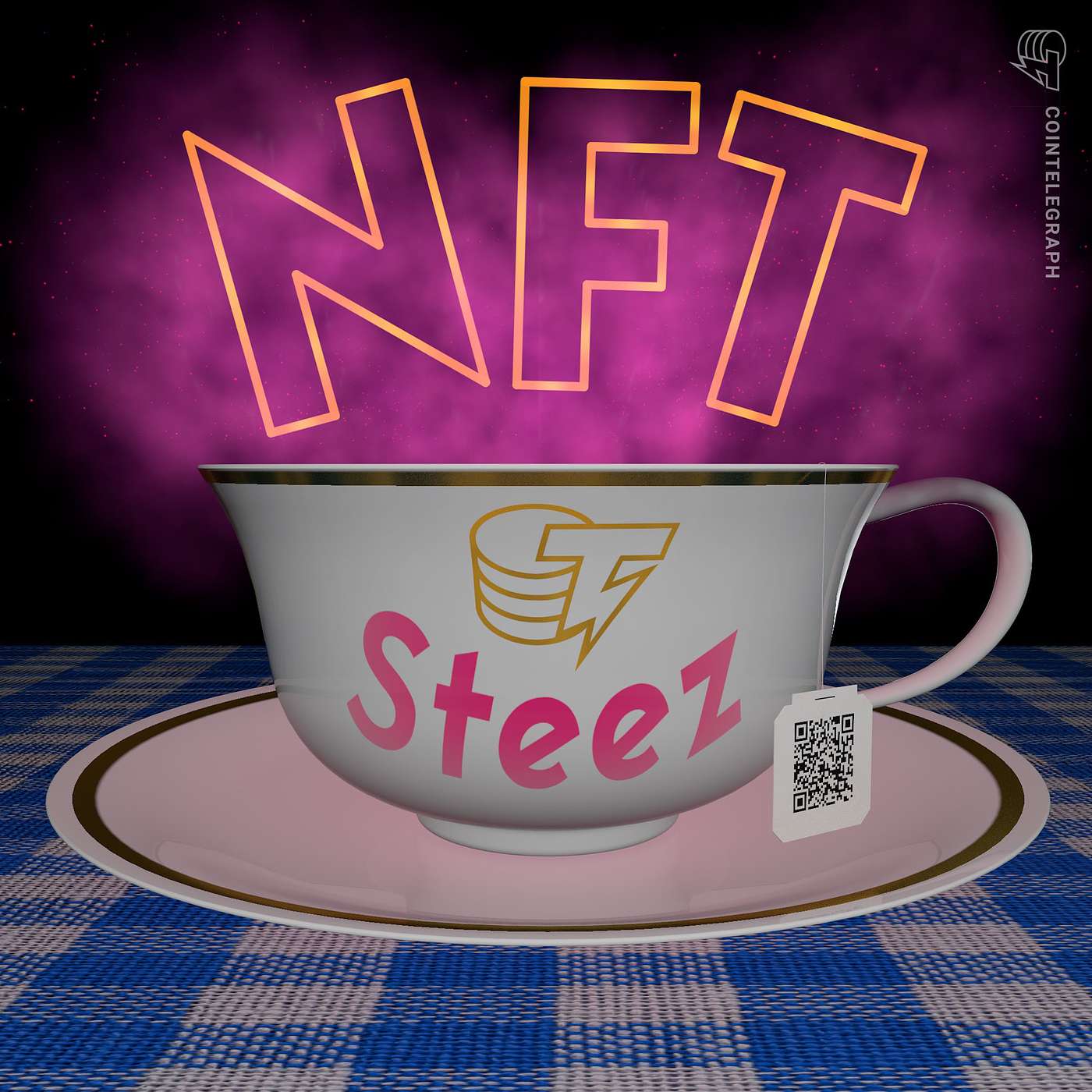Cointelegraph business editor Sam Bourgi and journalist Gareth Jenkinson break down the major talking points from the United States banking collapse fiasco, and discuss whether the cryptocurrency industry is being targeted by regulators nationwide. The collapse of Silicon Valley Bank and Signature Bank directly affected several prominent cryptocurrency companies, even causing Circle’s U.S. dollar-pegged stablecoin USDC to lose its peg for a couple of days.
Cointelegraph’s Twitter: @Cointelegraph
Cointelegraph’s website: cointelegraph.com
The views, thoughts and opinions expressed in this podcast are its participants’ alone and do not necessarily reflect or represent the views and opinions of Cointelegraph. This podcast (and any related content) is for entertainment purposes only and does not constitute financial advice, nor should it be taken as such. Everyone must do their own research and make their own decisions. The podcast’s participants may or may not own any of the assets mentioned.
Crypto in the crosshairs? US bank failures leave more questions than answers
Episodes
Crypto’s real-world adoption in 2025 and what builders should expect in 2026
2025 was a year of major shifts for crypto and not just in headlines, but in what actually matters for builders: fundamentals, real-world use cases and sustainable revenue.
In this episode of Byte-Sized Insight, we are joined by Leonard Dorlöchter, co-founder of peaq, to break down what quietly worked in 2025 and what the industry should be paying attention to in 2026. Leonard explains how DePIN began gaining real traction, why “fundamentals started mattering more,” and how the industry may be maturing while also losing sight of Web3’s original decentralization ethos.
The conversation also explores the rise of AI agents and robotics, new standards for machine-to-machine coordination, and what it could look like when devices, machines and autonomous agents begin transacting onchain as part of a global machine economy.
(1:58) Leonard introduces peaq and the “machine economy”
(4:03) 2025 shift: fundamentals and real revenue start to matter
(5:24) Web3 maturity vs. losing the decentralization ethos
(7:33) Blockchain as neutral global infrastructure and governance layer
(10:45) 2025 breakthroughs: physical AI and new standards for agents
(12:18) Why machine coordination is moving onchain
(13:31) Breaking down “machine economy” onchain vs offchain
(14:01) Example: tokenized machines, peer-to-peer energy, shared ownership
(17:51) Trust, reputation and efficiency in an open-machine economy
(20:23) Real-world adoption: robot in production in Hong Kong, onchain rewards
(22:06) 2026 outlook: robotics protocols, onchain goods/services, sovereign agents
(25:12) Policy gap: regulation progress but not fully aligned with Web3 ethos
(28:42) Why peaq partnered with VARA, machine economy free zone sandbox
(30:12) Builder advice for 2026: validate value, traction and real revenue
This episode was hosted and produced by Savannah Fortis, @savannah_fortis.
Follow Cointelegraph on X @Cointelegraph.
Check out Cointelegraph at cointelegraph.com.
If you like what you heard, rate us and leave a review!
The views, thoughts and opinions expressed in this podcast are its participants alone and do not necessarily reflect or represent the views and opinions of Cointelegraph. This podcast (and any related content) is for entertainment purposes only and does not constitute financial advice, nor should it be taken as such. Everyone must do their own research and make their own decisions. The podcast’s participants may or may not own any of the assets mentioned.
Stablecoins took over crypto in 2025: Here’s what the data says about 2026 (feat. Chainalysis)
2025 marked a turning point for crypto not in price cycles or hype, but in how the industry is actually used, regulated and understood.
In this episode of Byte-Sized Insight, we’re joined by Matthias Bauer-Langgartner, Head of Policy for Europe at Chainalysis, to break down what really happened in crypto in 2025, using data, not headlines.
We dig into how 2025 became the year of the stablecoin, how stablecoins now dominate on-chain activity and crypto crime, why illicit crypto flows surged even as adoption went mainstream and how crypto crime has taken on a more geopolitical dimension. The conversation also goes into how regulators, particularly in Europe, have matured in their approach, what MiCA changed on the ground and what crypto companies should be preparing for as they head into 2026.
You don’t want to miss it!
(00:08) Welcome to Byte-Sized Insight + 2026 series kickoff
(01:20) Introducing Matthias Bauer-Langgartner and Chainalysis
(03:47) Where the global crypto industry stands in January 2026
(04:40) On-chain growth and the rise of stablecoins
(05:58) Stablecoins overtake Bitcoin in transactional volume
(09:02) Why regulators focus on stablecoins first
(11:06) Institutional adoption and MiCA’s impact in Europe
(13:18) Are European regulators more confident after 2025?
(17:38) Who really has leverage in crypto now?
(19:49) Crypto Crime Report 2025: record illicit flows
(21:44) Nation-state crypto crime and sanctioned stablecoins
(23:17) Why stablecoins dominate illicit activity and why that matters
(28:15) Top policy, crime, and security trends for 2026
(32:10) Cybersecurity, DORA, and real-time on-chain monitoring
(34:27) Advice for crypto companies entering Europe in 2026
This episode was hosted and produced by Savannah Fortis, @savannah_fortis.
Follow Cointelegraph on X @Cointelegraph.
Check out Cointelegraph at cointelegraph.com.
If you like what you heard, rate us and leave a review!
The views, thoughts and opinions expressed in this podcast are its participants alone and do not necessarily reflect or represent the views and opinions of Cointelegraph. This podcast (and any related content) is for entertainment purposes only and does not constitute financial advice, nor should it be taken as such. Everyone must do their own research and make their own decisions. The podcast’s participants may or may not own any of the assets mentioned.
UK crypto regulation is coming: Inside the FCA’s sweeping new consultation
The UK is taking a major step toward fully regulating crypto markets.
This week on Byte-Sized Insight, we break down the Financial Conduct Authority’s sweeping new consultation covering crypto exchanges, staking services, lending, and decentralized finance and what it could mean for the future of the UK crypto industry.
We’re joined by Perry Scott, Head of UK Policy at Kraken and Chair of the UK Cryptoasset Business Council, to unpack what’s actually new in the proposals, why the October 2027 timeline matters and whether regulatory clarity could make the UK more competitive globally.
(00:00) Welcome to Byte-Sized Insight
(00:45) UK launches sweeping crypto consultation
(03:20) Why this is a turning point for UK crypto
(05:00) Perry Scott on the scale of the proposals
(06:45) The 2027 timeline: “the firing gun has been fired”
(08:20) UK vs EU vs US: second-mover advantage
(09:45) Market structure and global liquidity
(11:05) Staking gets bespoke rules
(12:20) Crypto lending: from bans to guardrails
(13:35) How the FCA is approaching DeFi
(15:10) Will regulation drive firms offshore?
(17:20) What comes next for UK crypto
This episode was hosted and produced by Savannah Fortis, @savannah_fortis.
Follow Cointelegraph on X @Cointelegraph.
Check out Cointelegraph at cointelegraph.com.
If you like what you heard, rate us and leave a review!
The views, thoughts and opinions expressed in this podcast are its participants alone and do not necessarily reflect or represent the views and opinions of Cointelegraph. This podcast (and any related content) is for entertainment purposes only and does not constitute financial advice, nor should it be taken as such. Everyone must do their own research and make their own decisions. The podcast’s participants may or may not own any of the assets mentioned.
Can ESMA Fix MiCA?: Europe regulated crypto first, now it considers a central regulator
Europe was the first major region to roll out a comprehensive crypto framework, but now it’s rethinking how that framework is enforced.
In this episode of Byte-Sized Insight, we break down the European Union’s proposal to centralize crypto supervision under the European Securities and Markets Authority (ESMA), a move that would shift oversight of crypto-asset service providers away from national regulators and toward a single EU-level authority.
To understand what’s happening on the ground, we speak with Dr. Lewin Boehnke, chief strategy officer at Crypto Finance Group, who offers a rare perspective from both Switzerland’s mature crypto market and the EU’s newly regulated one. He explains why MiCA’s overall approach makes sense, where technical details are slowing adoption and why centralizing supervision under ESMA could actually help reduce friction rather than create it.
(1:55) Europe moves to centralize crypto oversight under ESMA
(4:58) Why MiCA’s rollout has been slow, and why that’s not surprising
(5:24) Switzerland’s head start on institutional crypto adoption
(6:38) Why MiCA’s focus on regulating intermediaries makes sense
(7:48) The MiCA Article 75.6 ambiguity slowing banks down
(9:09) Why Europe’s quieter regulatory approach may be a long-term strength
(10:13) Uneven MiCA enforcement across Germany, Luxembourg, and Malta
(12:26) What Europe should prioritize in crypto regulation over the next year
This episode was hosted and produced by Savannah Fortis, @savannah_fortis.
Follow Cointelegraph on X @Cointelegraph.
Check out Cointelegraph at cointelegraph.com.
If you like what you heard, rate us and leave a review!
The views, thoughts and opinions expressed in this podcast are its participants alone and do not necessarily reflect or represent the views and opinions of Cointelegraph. This podcast (and any related content) is for entertainment purposes only and does not constitute financial advice, nor should it be taken as such. Everyone must do their own research and make their own decisions. The podcast’s participants may or may not own any of the assets mentioned.
The first U.S. state to buy Bitcoin: Why is Texas going all in?
Texas just became the first US state to purchase and hold Bitcoin, and it did so during a market downturn, while many institutions and state treasuries were selling or backing away from crypto entirely.
In this episode of Byte-Sized Insight, we break down alongside Lee Bratcher, founder and president of the Texas Blockchain Council, why Texas made a $5 million Bitcoin ETF purchase (with another $5 million earmarked for self-custodied BTC), how a years-long political history set the stage and what this move means for US crypto policy.
Is Texas making a bold strategic play or taking on unnecessary risk? And could this be the spark that reignites the conversation around Bitcoin in public finance?
(00:08) Texas becomes the first U.S. state to purchase and hold Bitcoin
(00:33) Why Texas buying Bitcoin during a downturn matters
(02:28) Texas’s long-term Bitcoin thesis and the significance of the timing
(03:38) Greg Abbott’s early Bitcoin advocacy: 11 years before Texas’s buy
(04:54) Abbott on Texas becoming a global hub for Bitcoin and blockchain
(08:05) Why Texas is treating Bitcoin as a multi-decade strategic asset
(09:34) How Texas’s Bitcoin purchase could influence other U.S. states and policymakers
(11:13) Texas’s energy, finance, and demographic advantages in Bitcoin adoption
(12:55) Closing insight: Texas and Bitcoin as long-term partners beyond market cycles
This episode was hosted and produced by Savannah Fortis, @savannah_fortis.
Follow Cointelegraph on X @Cointelegraph.
Check out Cointelegraph at cointelegraph.com.
If you like what you heard, rate us and leave a review!
The views, thoughts and opinions expressed in this podcast are its participants alone and do not necessarily reflect or represent the views and opinions of Cointelegraph. This podcast (and any related content) is for entertainment purposes only and does not constitute financial advice, nor should it be taken as such. Everyone must do their own research and make their own decisions. The podcast’s participants may or may not own any of the assets mentioned.
Crypto turbulence in 2025 explained: A practical guide to navigating market volatility
The crypto markets have been battered over the past several weeks with Bitcoin sinking from six-figure highs to the low-$80Ks, more than a trillion dollars wiped from crypto’s total market cap and record ETF outflows shaking investor sentiment. Unlike previous drawdowns triggered by blow-ups or bad actors, this downturn is different: It’s macro-driven, liquidity-driven and deeply tied to broader global markets.
In this episode of Byte-Sized Insight we hear from the author of “Crypto is Macro Now,” Noelle Acheson; co-founder and CEO of LO:TECH, Tim Meggs; and author of “The Crypto Trader,” Glen Goodman, to help break down the forces behind the volatility and offer clear, grounded perspective for navigating the turbulence.
(0:24) Bitcoin plunges from $120K to $80K and the market wipes out $1.2 trillion
(1:08) Why this downturn feels different from past crashes
(2:55) Noelle Acheson explains why the dip is “a blip” and liquidity-driven
(3:52) How macro sentiment, not crypto-specific issues, is driving this correction
(4:59) Why this drawdown isn’t systemic like 2017 or 2022
(6:03) Bitcoin dominance drops during the downturn and why that’s never happened before
(7:38) Noelle breaks down “short-term noise vs. long-term debasement thesis”
(10:28) Tim Meggs: Why this drawdown is slow, measured, and institution-driven
(12:05) Inside the market: What liquidity providers look for during stress
(13:22) Signs of stabilization and why healthy corrections matter
(15:41) Glen Goodman: How institutional money changed the structure of crypto cycles
(20:34) Why today’s downturn lacks a narrative and why that weakens crypto rallies
(23:04) Survival rules: managing leverage, mental resilience & “reduce to the sleeping point”
This episode was hosted and produced by Savannah Fortis, @savannah_fortis.
Follow Cointelegraph on X @Cointelegraph.
Check out Cointelegraph at cointelegraph.com.
If you like what you heard, rate us and leave a review!
The views, thoughts and opinions expressed in this podcast are its participants alone and do not necessarily reflect or represent the views and opinions of Cointelegraph. This podcast (and any related content) is for entertainment purposes only and does not constitute financial advice, nor should it be taken as such. Everyone must do their own research and make their own decisions. The podcast’s participants may or may not own any of the assets mentioned.
Authors
About podcast
The Decentralize with Cointelegraph podcast covers all things Web3 and cryptocurrency, from challenges facing the industry to breaking news and in-depth dives into the culture of BTC, Ethereum and Web3. Experience crypto news like never before with the Decentralize with Cointelegraph podcast.
Other podcasts
Disclaimer These podcasts (and any related content) are for entertainment purposes only and do not constitute financial advice, nor should they be taken as such. Everyone must do their own research and make their own decisions. The podcasts' participants may or may not own any of the assets mentioned.


.png)




